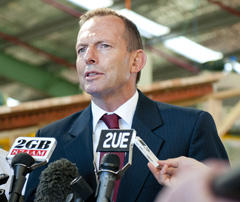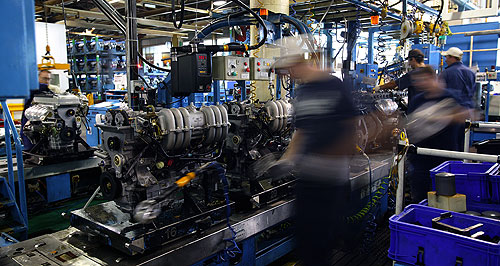News - General News - RegulationCarbon price ‘to add $220 to $412 to car cost’Price of carbon: Opposition leader Tony Abbott used a visit to Ford's Victorian plant in Geelong to raise the possibility of lost jobs in the automotive industry due to Labor's carbon price. Industry study counts the cost of a carbon tax on local car-makers17 May 2011 A CARBON tax could add between $222 and $412 to the cost of each car made in Australia if the carbon price is set at between $20 and $30 a tonne, according to a report prepared on behalf of the Australian motor industry. The investigation, by PricewaterhouseCoopers Australia (PWCA), found that the overall cost to the $6.2 billion domestic automotive industry was likely to be between $30 million and $84 million, depending on factors including compensation. The report warned that additional cost burdens could threaten plans for growth in the automotive industry, which it described as “vulnerable”. The report was commissioned jointly by the Federal Chamber of Automotive Industries (FCAI) and Federation of Automotive Parts Manufacturers (FAPM). The opposition leader Tony Abbott used the figures during a visit to Ford’s factory at Geelong in Victoria today to raise the spectre of lost jobs in the motor industry due to Labor’s carbon tax. “If the carbon tax turns out to be the nail in the coffin of the motor manufacturing industry in this country, that spells disaster for Australia as a first-world economy,” he said. “We want to be a country that makes things, and the risk with this carbon tax is that we will stop being a country that makes things any more – an absolute disaster for Australia.” The federal government is set to spell out the details of its carbon tax plan by July, with the scheme set to be introduced on July 1, 2012.  Left: Opposition leader Tony Abbott. Left: Opposition leader Tony Abbott.The PWCA report said each domestically made vehicle would have a CO2 footprint of between 11.1 tonnes and 13.6 tonnes. The largest proportion – between 6.0 and 7.8 tonnes – would be embodied in the manufacturing of materials such as steel, aluminium and plastics. Parts manufacturing would generate between 2.6 and 3.5 tonnes and vehicle assembly 1.5 tonnes, while small amounts would be contributed by air-conditioning gases, the retailing of the vehicle and transportation. The report said the extent of greenhouse gas emissions depended on factors such as the size of the vehicle, extent of local content, vehicle configuration and energy supply mix. Of the materials used in the typical vehicle, steel was by far the biggest contributor of greenhouse gases, at 67 per cent, followed by aluminium on 26 per cent. Plastics rated only two per cent. PWCA warned in its report that the local automotive industry was likely to have little or no ability to pass on any additional cost burden, due to the highly competitive international market. It said the three local manufacturers were likely to source components from international markets to avoid incurring a carbon price within automotive products. “The automotive industry is a highly value-adding industry, and a reduction in its competitiveness in the global automotive market could ultimately result in a loss of these value-adding activities offshore,” the report concluded. The visit to Ford by Mr Abbott and shadow minister for industry, Sophie Mirabella, was pointed, as the Geelong engine plant has been described as one the most vulnerable of the Australian car company factories. Ms Mirabella said a carbon price was going to price Australian cars out of the market, with imported vehicles swarming the market. “If the Labor Party cares for workers, for their families, who work at Ford, who work in manufacturing across Australia, they must start to listen to their concerns. “They must start to listen to what they want, and they want to keep their jobs. They want to continue to make things in Australia, they don’t want a carbon tax.” Mr Abbott said the coalition accepted climate change and humanity’s impact on global warming. He said the coalition would use $1 billion saved out of the budget to reduce emissions by planting more trees on suitable land, getting more carbon into the soil and turning carbon dioxide waste from power stations into thing such as biodiesel and stock feed.  Read more |
Click to shareGeneral News articlesResearch General News Motor industry news |















Facebook Twitter Instagram